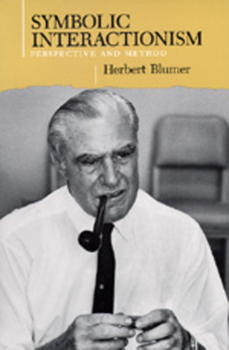Symbolic Interactionism: Perspective and Method
Select Format
Select Condition 
Book Overview
This is a collection of articles dealing with the point of view of symbolic interactionism and with the topic of methodology in the discipline of sociology. It is written by the leading figure in the... This description may be from another edition of this product.
Format:Paperback
Language:English
ISBN:0520056760
ISBN13:9780520056763
Release Date:April 1986
Publisher:University of California Press
Length:224 Pages
Weight:0.74 lbs.
Dimensions:0.6" x 6.8" x 9.0"
Customer Reviews
2 ratings
Informative
Published by Thriftbooks.com User , 19 years ago
Meaningful communication occurs in context. In fact the context frames the message. Blumer describes how factors such as relationships and interpretation construct meaning. Relationships have histories. Meanings change as relationships mature. If one is to understand interpretation, one must be familiar with these realities.What is "real" is what is real in the mind of the receiver. Individual interpretation is the essence of communication. Blumer makes a lot of sense in describing how people attribute meaning to symbols and objects based on what is real to them. Groups are another element in the overall process of creating meaning. This book helps you to gain a better understanding of how individuals create meaning in their lives.
An essential book for sociologists/social scientists
Published by Thriftbooks.com User , 22 years ago
Herbert Blumer's Symbolic Interactionism: Perspective and Method is an essential read for any student/teacher of sociology or the social sciences/humanities. Written in 1969 Blumer's book was and still is the cornerstone of symbolic interactionism and exemplifies the philosopy of the 'Chicago School' of social science. Blumer expands on philosopher and social psychologist George Herbert Mead's highly illuminating work 'Mind, Self and Society' which was published in 1934. Blumer went on to coin the term symbolic interactionism in 1937. With this book Blumer emphasises the sociological implications of Mead's work most importantly the importance of the self conscious social actor and how he 'defines his situation' and acts accordingly due to his possession of 'self'. The human social actor for Blumer is not merely a product of the structural elements of his/her society but how s/he actively shapes their environment. Thus Society for Blumer is not the product of structural factors such as society's institutions, social conflict or consensus, or other deterministic factors. Society is comprised of many social actors all involved in the process of interaction and how each person is 'reflexive' in their own 'definition of the situation'. Blumer states that symbolic interactionism rests on three simple premises. Firstly that human beings act towards things on the basis of the meanings the things have for them. Meanings and objects become of central relevance when viewed from Blumer's perspective rather than taken for granted or pushed aside as is the case with conventional sociology and psychology. Secondly meanings of such things occurs through social interaction that is we only recognise a chair for example as a place to sit because we are taught this through interaction with others. Thirdly meanings are handled and modified through an interpretative process by the person who is interacting with any given object. This means that social life is an ongoing process of activity whereby the social actor interprets the situation which confronts him and acts accordingly. Parochial schemes advocated by conventional sociology such as social conflict, consensus, norms, values etc fail to recognise the importance of social actors and the interaction which occurs between people as Blumer states they 'leap over the acting units which comprise society'. Group life for Blumer is the 'fitting together of individual lines of action' by many individual actors. This is not to say that symbolic interactionism denies the existence of social structure what Blumer is saying is that social structures exist but they do not determine action. For Blumer the empirical world 'stands over and above the scientific observer' and therefore must be the central point of concern. Symbolic interactionism should as Blumer states cover the 'full scientific quest' and should be prepared (to quote Robert Park) 'to get the seat of your pants dirty' in other words get out into the empirical w





